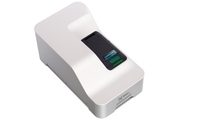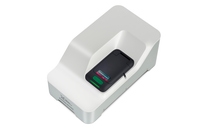Electrophoretic Light Scattering (ELS)
Measurement of zeta potential and electrophoretic mobility of particles

Measurement of zeta potential and electrophoretic mobility of particles

Electrophoretic Light Scattering (ELS) is a technique used to measure the electrophoretic mobility and zeta potential of particles in dispersion, or molecules in solution.
The term comes from electrophoresis (movement of a charged particle relative to its suspension medium due to an applied electric field) and from the fact that the frequency shift of light scattered from the moving particles is measured.
In an ELS experiment, it is actually the mobility of the particle that is measured, and this can be converted to zeta potential when some physical parameters of the sample are known, namely the dielectric constant and viscosity of the dispersion medium and Henry’s function (F(Κa)).
Henry’s function is the ratio of the particle radius to the electrical double-layer thickness and is often approximated to 1.0 for a non-polar system (Hückel approximation) or to 1.5 for polar systems (Smoluchowski approximation).
This conversion to zeta potential better enables the comparison of materials under different experimental conditions, whilst particle mobility can be used when conversion factors are not well defined.
In practical terms, a dispersion is introduced into a cell containing two electrodes. An electrical field is applied to the electrodes, and particles or molecules that have a net charge, or more strictly a net zeta potential, will migrate towards the oppositely charged electrode with a velocity, proportional to their charge.
The particle mobility and direction (hence the electrical sign) are determined using Phase Analysis Light Scattering (PALS).
PALS analyses the phase difference resulting from the frequency (Doppler) shift of light scattered from the sample compared to a mutually coherent modulated reference beam that bypasses the sample. Combining these two beams produces a modulated signal with a much smaller frequency than the light source due to constructive and destructive interference. This “beat” frequency is equal to the frequency difference between the scattered and reference beams and is used to determine the mobility of the particles. PALS enables us to be more sensitive to smaller frequency shifts (for lower mobility samples) and directly determines the sign of the charge on the particles.
There are many things to consider when making an ELS measurement. At Malvern Panalytical we take all of these factors into account so you can obtain the most accurate and precise mobility and zeta potential measurements.
These include:
Electrophoretic light scattering (ELS) measurements can be applied to a wide range of application areas covering multiple scientific and industrial domains.
By harnessing the principles of light scattering and electrophoresis, ELS enables precise characterization of particles and molecules in solution.
Below are some key applications where ELS technology plays a pivotal role.

ELS and dynamic light scattering are widely utilized for determining both the zeta potential and size of nanoparticles.
This is crucial in various fields such as nanotechnology, drug delivery, and materials science, where understanding the behavior of nanoparticles in solution is essential for optimizing their performance.

In biochemistry and biophysics researchers use ELS to assess the stability of protein formulations.
This is used for aiding drug development and biopharmaceutical manufacturing.
ELS provides valuable insights into the stability of colloidal dispersions by measuring the zeta potential of particles.
This information is critical for industries such as paints and coatings, cosmetics, and food and beverage, where maintaining the stability of colloidal systems is essential for product quality and shelf-life.


ELS is employed for determining the zeta potential of polymers in solution.
This is vital in understanding their colloidal stability which is essential in polymer science and engineering for quality control, formulation optimization, and understanding polymer behavior under different processing conditions.
ELS finds applications in environmental science for analyzing colloidal systems in natural waters, soils, and sediments.
Researchers use ELS to study the mobility and behavior of colloidal pollutants, nanoparticles, and biomolecules, aiding in environmental monitoring and risk assessment.
ELS plays a key role in pharmaceutical research and development by providing critical data on the stability, aggregation propensity, and surface charge of drug formulations.
This helps pharmaceutical companies in optimizing formulation parameters and ensuring the safety and efficacy of drug products.
ELS is utilized in agricultural and food industries for analyzing the stability and quality of emulsions, suspensions, and colloidal ingredients.
By monitoring particle size and zeta potential, ELS assists in improving product stability, texture, and sensory attributes.
In biomedical research, ELS is used for studying biological macromolecules, such as DNA, RNA, and viruses.
Researchers employ ELS to investigate molecular interactions, conformational changes, and aggregation phenomena, facilitating advancements in diagnostics and therapeutics.
Malvern Panalytical offers leading instrumentation that uses electrophoretic light scattering for the measurement of electrophoretic mobility.
The Zetasizer provides a simple, fast and accurate way to measure zeta potential, and we were the first to offer a disposable capillary cell to ensure that there is no cross-contamination between samples.


Zetasizer UltraThe world’s most trusted light scattering system |

Zetasizer ProHigh performance, versatile and robust |

Zetasizer LabClassic side scatter particle size and zeta potential analyzer with enhanced capabilities |
|
|---|---|---|---|
| Measurement type | |||
| Zeta potential | |||
| Technology | |||
| Dynamic Light Scattering | |||
| Electrophoretic Light Scattering | |||
| Environment | |||
| Environment | Lab - bench | Lab - bench | Lab - bench |